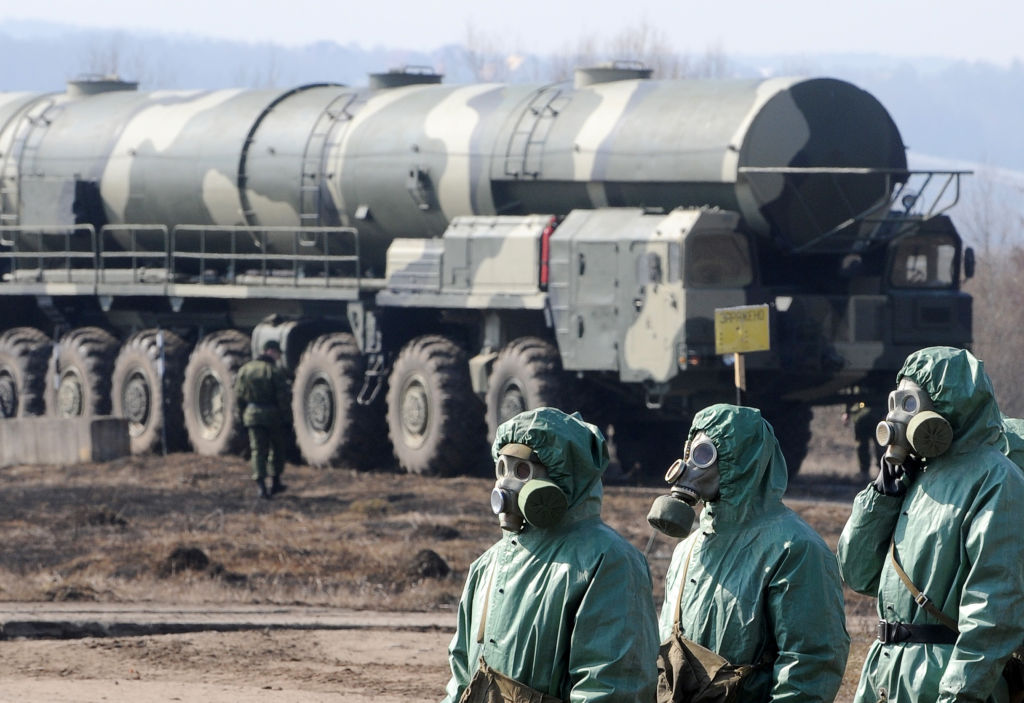The most important story in the world remains the war in Ukraine, and the most important aspect of that story is Russia’s fake “warnings” to the West that Ukraine is plotting to detonate a “dirty bomb.” The ploy is obvious—to provide a pretext for actual escalation or for threats of escalation that could accomplish Putin’s purposes without the monumental peril of a nuclear strike.
To explain the nature of Putin’s threat and to understand Putin’s reasoning, let me first turn to my friend Tom Nichols, writing in The Atlantic. First, what is a dirty bomb?
A dirty bomb isn’t actually a nuclear bomb. It is, to use the clunky term professionals apply to it, a radiological dispersal device, which is just another way of saying that it is a conventional explosive wrapped around a lot of dangerous radioactive material. When the bomb explodes, it is not a nuclear detonation, but only the normal explosion of something like TNT or other munitions. The difference is that this conventional explosion spreads around a lot of radioactive material, poisoning anyone nearby and rendering the area highly dangerous—perhaps even impassable. The gunk inside a dirty bomb could be anything that is highly radioactive: nuclear reactor waste, the leftover pieces of a nuclear weapon, even radiological materials from a hospital.
Second, what is Putin’s potential strategy?
This dirty-bomb charge could be part of the preparation for a Russian “false flag” operation, in which the Russians will explode their own dirty bomb, perhaps in the occupied territories of Ukraine or close to the Russian border; blame Ukraine; and then demand that Ukraine surrender or face nuclear retaliation. It could also be a way of trying to scare off Ukraine’s Western supporters with threats of escalation.
To understand Putin’s thinking, it’s necessary to dive deeper into the current military reality of the Ukraine war. In a nutshell, Ukraine is winning on the battlefield, and there are no foreseeable short or medium-term prospects for Russia substantially reversing that momentum.
Russia has taken staggering losses in men and material. It’s reportedly running short on precision munitions. Its best units have taken catastrophic casualties. And it is unlikely that plugging even large numbers of untrained or poorly-trained conscripts into a modern battlefield can substantially reverse Ukraine’s momentum.
At the same time, however, it’s important to remember that Ukrainian success depends on two key factors: Ukrainian valor and western (mainly American) arms supplies. Ukraine does not have an indigenous weapons manufacturing capability sufficient to sustain a long war against a great power.
Thus, if Putin can’t break Ukrainian will, he can still prevail if he can choke off Ukrainian supplies, and that truly means choking off American supplies. We’re the only western power with the combination of weapon stocks and production capacity sufficient to keep Ukraine in the fight indefinitely. Russia can out-produce Ukraine, but it cannot out-produce the United States.
But why would we stop supplying Ukraine? At present American aid to Ukraine (roughly $54 billion, including close to $14 billion in direct military assistance) represents one of the most cost-effective security investments in modern American history. The Russian military will take years to regenerate. Its ground forces are a shadow of their former strength, and the Russian air force and navy have both suffered substantial losses.
Yet Russia can change the calculus if it can intimidate American politicians into believing that American aid risks an unacceptable escalation. Nuclear threats aren’t yet intimidating Ukrainians. Will they intimidate Americans?
That possibility is what made the timing of the House Progressive Caucus’s decision to release a letter urging that the Biden administration engage in direct talks with Russia so deeply unfortunate. The letter itself, which was signed by 30 liberal House members, was essentially incoherent. But to the extent it had a message, the letter didn’t just ask for direct engagement with Russia, it also raised the possibility that the left wing of the Democratic Party wasn’t as united with the Biden administration as we thought.
Combine the progressive letter with the fact that 57 Republican House members had already voted no on the last Ukraine package, throw in recent comments from presumptive future House speaker Kevin McCarthy that the American people are not going to “write a blank check” to Ukraine, and you can see a potential critical mass of opposition to additional funding—or to sufficient funding for Ukraine to maintain its momentum in the war.
House progressives fortunately faced an immediate backlash from their own party and hours later climbed down. They retracted the letter. Good.
But I wonder. How much damage was done? Does Vladimir Putin now see sufficient cracks in the American coalition to press his perceived advantage? It’s here that his nuclear blackmail starts to make diabolical sense. If he believes that American support for Ukraine isn’t entirely solid, but he also knows that he can’t count on Ukrainian battlefield failures to shake Ukraine’s American allies—and that Russia’s ability to manipulate energy markets is less potent against America than Europe—then what’s left?
We’re facing a critical moment in world history. It’s imperative that the United States not just refuse to yield to nuclear blackmail but that it also deter nuclear use. Either a withdrawal of support for Ukraine or an actual nuclear blast would represent a failure of American policy. Thus the message to Putin has to be clear and firm—no retreat from Ukrainian support and no tolerance for nuclear first use. We must vow to make the costs unacceptably high.
It’s difficult to grasp the stakes of failure—with failure defined either as a Russian nuclear strike or as the U.S. ending support for Ukraine. Actual nuclear use would lead to mass casualties, potential direct conflict with Russia, even potential escalation into a great power nuclear exchange. It would make the worst crises of the Cold War seem tame by comparison.
But there are terrible costs of yielding to Russia as well. Giving in to nuclear blackmail would bestow on nuclear-armed aggressors a de facto right of aggressive war. The destabilizing effects would ripple across the world. The pressure towards nuclear proliferation would be irresistible. If the only way to guarantee national sovereignty is by obtaining the ultimate weapon, look for every advanced nation that faces security threats to consider adding a nuclear component, and look for nuclear-armed aggressors to take advantage of their rivals’ window of vulnerability.
Nuclear use is unacceptable. Capitulation is unacceptable. That leaves deterrence. Can the Biden administration credibly signal to Putin that a nuclear strike will be a catastrophe for Russia?
This, friends, is one reason why we pray for our presidents. This is one reason why it is Grade A idiocy and lunacy to argue—as so very many people now do—that character is somehow optional in leaders. Only “policy” matters. But consider the sheer amount of wisdom, prudence, and intelligence required in this moment. The proper policy isn’t just a matter of “what” but also “how.” How do we communicate what we plan in the event of a Russian strike? How much of that plan do we communicate?
There’s also a necessity of a particular kind of humility—the willingness to be open to challenging ideas and the refusal to entirely trust your own instincts.
It’s one thing to state the policy that we should not give into nuclear blackmail and we must deter nuclear use. It’s another thing entirely to execute that policy. Yet as we walk into the midterms, how many Americans are looking at their congressional candidates and asking this key question—do I trust this person to be among the leaders who help navigate the United States and the world through one of the worst crises in modern history?
We don’t know if Russia is preparing to use a dirty bomb. We don’t know if Russia intends to escalate beyond its conventional war against Ukraine. But we do know this—that unless we choose to make Ukraine strong, then even Ukraine’s incredible valor may not prove to be sufficient to stop the sheer force of Russian arms.
I’m reminded of Ronald Reagan’s “bear in the woods” ad from 1984. Except this time, the nation that needs to be “as strong as the bear”—at least in the field of conventional battle—is the nation of Ukraine. We have helped make them strong. We can help keep them strong. Putin’s nuclear blackmail cannot succeed.







Please note that we at The Dispatch hold ourselves, our work, and our commenters to a higher standard than other places on the internet. We welcome comments that foster genuine debate or discussion—including comments critical of us or our work—but responses that include ad hominem attacks on fellow Dispatch members or are intended to stoke fear and anger may be moderated.
With your membership, you only have the ability to comment on The Morning Dispatch articles. Consider upgrading to join the conversation everywhere.